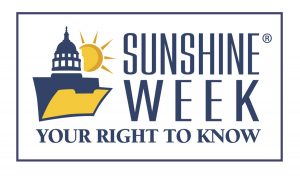
“Open government is good government” is the message of Sunshine Week, March 11-17; and while it is proper to pause to r
eflect on that concept annually, the fight for transparency is not one that is limited to seven days each year.
If you asked the average citizen, he or she would probably agree that open government is a good thing and that people should have a right to know what their government is doing. Unfortunately, a shadow is being cast on openness at all levels as those in power now find it fashionable to demonize the people whose job it is to keep government accountable.
This can be seen starting at the highest levels of our government where the president and his administration have taken the traditionally adversarial relationship with the media to new levels and routinely dismiss any unfavorable reporting as “fake news.”
Whether by design or as an unintentional consequence, the United States government is becoming increasingly less open about its business. According to an Associated Press analysis released just this week, “The federal government censored, withheld, or said it couldn’t find records sought by citizens, journalists and others more often last [fiscal] year than at any point in the past decade.”
Closer to home just last month, a representative of the Texas Attorney General’s Office made it seem okay to delay releasing information as a way to punish reporters. The Dalllas Morning News reported that the AG’s communications director, Marc Rylander, said during an open meetings/open records training session, “Communications guys love it when reporters make a request and you all wait until the 23rd hour of the 10th day to send it back to them.” A moderator at the training tried to pull Rylander back in line saying, “Don’t do that. Right? Right?” To which Rylander responded, “Depends on who the reporter is,” and later said, “It’s gotten so bad in newspapers especially that I almost got to the point that I avoid the newspaper people at all costs because newspapers have fired or had to let go all of their good journalists. … They peddle their rags on Groupon. … I mean, it’s a joke.”
It is bad enough that our state and federal officials have such a negative personal view of the press that they let it influence how they conduct their public duties. But the attitude is also becoming more prevalent at the local level as well. Just less than a year ago, one local board member, who was being grilled on open meetings issues by your editor, retorted, “What business is it of yours anyway?”
And sometimes citizens themselves don’t value the job “the media” does when reporting the news. Such was the case last month when the Enterprise came under attack after an illegal meeting was shut down by the sheriff and a small group of attendees began accusing the paper of not printing “the truth” – or at least their version of it.
There is, of course, an adversarial relationship between the press and those in positions of authority. Your editor has at times been at odds with different local officials to the point of even being lectured or ridiculed in public meetings by county commissioners, city aldermen, and school board members.
It happened again just last month when a public official took the opportunity to use the “other business” agenda item to critique our reporting on a previous meeting. It’s not always fun being in the reporter’s shoes, but it typically means you’re doing your job when a public official squeals for having been called out for his actions.
This newspaper, like so many others across Texas and across America, will not back down in the face of bullying, whether it comes from the White House, the state capitol, or a local official or citizen.
You have a right to know what’s going on with your government, and we’re here to champion that right. That’s what Sunshine Week is about. As we have stated before, the biggest defender of that right is not breitbart.com or World Net Daily. It is the traditional media – the often vilified “press” – that people love to hate. The big boys will hold the president’s feet to the fire – and even help bring him down if necessary, while the Enterprise and thousands of other hometown newspapers across this land will continue to shine the light on city councils, school boards, college boards, and county commissions.
Together we’ll fight in state legislatures and in Congress to keep government practices open so that you can see what your elected representatives are doing and find out what they are up to… even when they don’t want you to know.


Leave a Reply
You must be logged in to post a comment.